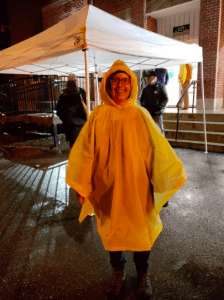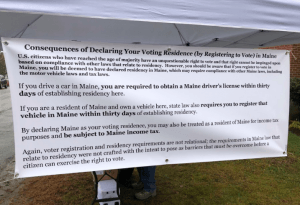Midterm Election Controversy
Nov 26, 2018 | Feature |

By Andrea Swiedom Contributing Writer
On election day, students saw Farmington

Professor Sarah Hardy in her “emergency voter suppression” poncho (Photo by Andrea Swiedom)
community member Bill Crandall, who set up a sign outside of the polls at the Farmington Community Center. Given Crandall’s professional setup, there has been controversy as to whether Crandall was posing as a poll official to intimidate young, first-time voters.
Crandall was bundled up and prepared for his self-imposed, all-day shift to inform the public about the laws outlined in the last paragraph of the Maine Voting Residence Fact Sheet on the maine.gov website. Even the professionally-made sign that displayed these laws had protection against the rain beneath a pop-up tent that faced the direction of High Street rather than the community center’s entrance on Middle Street.
Crandall was acting independently by presenting information about the responsibilities that follow registering to vote in Maine which include registering a vehicle within 30 days and potentially being subject to Maine income tax. Crandall did not include a single quote from the section of the voting fact sheet entitled “Students,” which clarifies the often confusing status of a student’s residency when attending an out-of-state university.
Students walking from campus often took High Street to get to the polls. For freshman Grace McIntosh and her friends, Crandall was their first impression of the community center when they walked from Mallett Hall.
McIntosh attended high school with Crandall’s son. “[I assumed Crandall was] someone who was helping out with the voting process, possibly that he was answering questions on what to do for first-time voters,” McIntosh said through an email.

Bill Crandall’s sign outside the Farmington Community Center (Photo by Andrea Swiedom)
To mathematics professor Sarah Hardy, the way in which Crandall presented these laws was “a little bit out of context.” Hardy is no stranger to voting rights activism and petitioned against the 2011 bill to appeal same day voting registration in Maine. When Hardy learned about Crandall’s sign from a long threaded email sent by concerned community members, her voter suppression alarm bells started ringing.
Hardy quickly brushed up on Maine voting laws and then set out with a bright yellow poncho determined to stick out the rest of the stormy day by standing right next to Crandall to ensure students were not intimidated to vote.
By the time Hardy arrived around 4 p.m., emails had already been sent out to faculty and students describing the sign as “misleading.” Despite Hardy’s presence at the polls and campus emails, the sign did cause at least one student to feel unraveled according to the president of UMF’s College Democrats Club, Jeffrey Willey, who spent election day in the student center reminding students how and where to vote.
Willey said, “One girl came up to me, she was like, pretty shaken…because she had convinced her friend to vote that morning and to go and register.” Willey explained that after she learned about the laws Crandall was presenting them, she was worried “that she had convinced her friend to break the law and that he was gonna go to jail and something serious like that.”
Crandall is willing to articulate his motives to The Farmington Flyer after he meets with interim president Eric Brown. Crandall said he feels like the situation was “blown out of proportion.”
Meanwhile, several community and faculty members feel as though Crandall’s efforts on election day were targeted towards deterring students from casting a ballot. As Hardy put it, with a stone-cold straight face, “Don’t mess with my students.”

